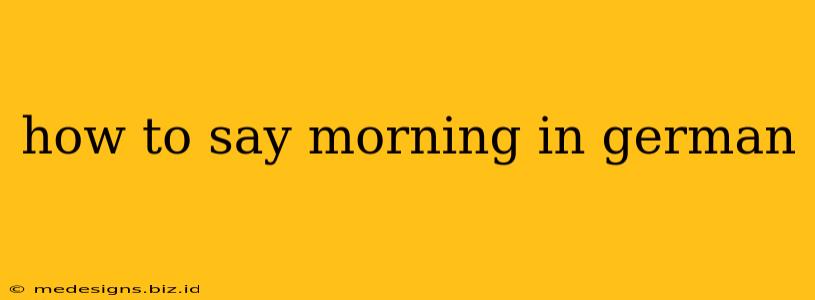Learning a new language can be exciting, and mastering everyday greetings is a great place to start. If you're wondering how to say "morning" in German, you're in the right place! This guide will explore various ways to greet someone in the morning in German, providing you with the context and nuances of each phrase.
Different Ways to Say "Good Morning" in German
The most common way to say "good morning" in German is "Guten Morgen". This is a perfectly acceptable and widely understood greeting for any time during the morning.
Guten Morgen: The Classic Greeting
- Pronunciation: GOO-ten MOR-gen
- Usage: This is the standard and versatile greeting, suitable for formal and informal settings. Use it with colleagues, family, friends, or strangers alike.
Beyond "Guten Morgen": Adding Nuance
While "Guten Morgen" covers most situations, understanding the context allows you to use more specific greetings:
- Informal Options: For close friends or family, you might hear variations like "Morgen!" (Morning!), which is a shorter, more casual version.
Understanding German Greetings: Time of Day Matters
German greetings often reflect the time of day. While "Guten Morgen" is specific to the morning, remember these related greetings:
- Guten Tag (Good Day): Used from roughly midday until evening.
- Guten Abend (Good Evening): Used from evening onwards.
- Gute Nacht (Good Night): Used when saying goodbye before bed.
Mastering German Greetings: Tips for Fluency
- Practice Makes Perfect: The best way to master these greetings is through consistent practice. Try using them in everyday conversations, even if it's just to yourself!
- Listen and Learn: Pay attention to how native German speakers use these greetings in different contexts. Immerse yourself in the language through movies, music, or podcasts.
- Context is Key: Understanding the formality of the situation will help you choose the most appropriate greeting.
Beyond the Basics: Expanding Your German Vocabulary
Learning how to say "good morning" is just the first step in learning German. Expanding your vocabulary will greatly enhance your communication skills. Consider learning other essential phrases, such as:
- How are you? (Wie geht es Ihnen? - formal; Wie geht es dir? - informal)
- Thank you. (Danke)
- You're welcome. (Bitte)
- Please. (Bitte)
By learning these greetings and expanding your German vocabulary, you will confidently navigate everyday conversations and make a positive impression on German speakers. Happy learning!
